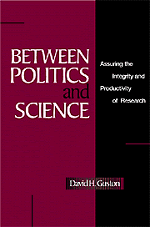Book contents
- Frontmatter
- Contents
- Tables and Figures
- Abbreviations
- Preface
- Introduction: Making Space for Science Policy
- Chapter 1 Science Policy: Structure and Boundaries
- Chapter 2 Understanding the Social Contract for Science
- Chapter 3 Challenges to the Social Contract for Science
- Chapter 4 Assuring the Integrity of Research
- Chapter 5 Assuring the Productivity of Research
- Chapter 6 Between Politics and Science
- Notes
- References
- Index
Chapter 5 - Assuring the Productivity of Research
Published online by Cambridge University Press: 14 October 2009
- Frontmatter
- Contents
- Tables and Figures
- Abbreviations
- Preface
- Introduction: Making Space for Science Policy
- Chapter 1 Science Policy: Structure and Boundaries
- Chapter 2 Understanding the Social Contract for Science
- Chapter 3 Challenges to the Social Contract for Science
- Chapter 4 Assuring the Integrity of Research
- Chapter 5 Assuring the Productivity of Research
- Chapter 6 Between Politics and Science
- Notes
- References
- Index
Summary
It became apparent that the strong U.S. policy emphasis on R.&D., even now still only slightly less than one half of the world's total, had not produced the results its earlier proponents had proclaimed. … [This is] a lesson that is by now well-learned, as a result of mistakenly equat[ing] R.&D. with innovation. … We have not appreciated the complexity of the process.
– J. Herbert Hollomon, former Assistant Secretary of Commerce (U.S. Senate 1979b: 20).Introduction
During the Kennedy administration, Herbert Hollomon had conducted an extensive review of the federal role in technological innovation. Despite the review, as he told Congress a decade and a half later, it was “other nations [that] began to understand and appreciate the importance of innovation and to perceive R.&D. as only one part of the complex process required to bring the new into practical and widespread use” (U.S. Senate 1979b: 19). Hollomon believed the United States had failed to adopt this attitude because of its hegemonic postwar position, which by the time of his testimony it had begun to lose to the aggressiveness of these foreign nations.
As policy scholar Harvey Averch (1985: 43) has argued, “The framers of the post-World War II ‘contract’ between the federal government and the scientific and technical community felt little concern about an innovation problem.” Complacency about the productivity of science was akin to that about the integrity of science – it was assumed to be an automatic function.
- Type
- Chapter
- Information
- Between Politics and ScienceAssuring the Integrity and Productivity of Reseach, pp. 113 - 137Publisher: Cambridge University PressPrint publication year: 2000



